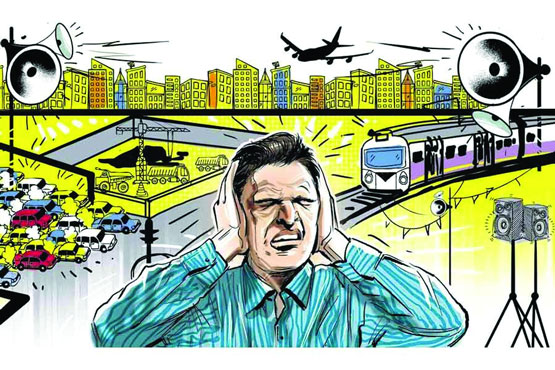City dwellers fed up with noise pollution
Staff Correspondent: The residents of the capital city of Dhaka have got sick of the honking of vehicles, thanks to lack of effective measures and monitoring by the authorities concerned.
The menace of sound pollution is worsening in the city day by day due to the growing number of public and private vehicles, causing harm for people’s physical and mental health.
Even horns are blown up more in areas where honking is prohibited. But there is no monitoring by the authorities concerned in this regard. The honking starts very early in the morning and continues unabated until midnight.
People suffer noise-induced hearing loss, and exposure to loud noise can cause high blood pressure, heart disease, sleep disturbances and stress.
On December 17 in 2019, the surrounding areas of the secretariat were declared as the ‘Silent Zone’ or ‘No Horn Zone’ with a provision of punishment for vehicles for flouting the ban in the respective areas.
However, while visiting the areas around the secretariat recently, it was seen that there is no signboard or any other tool mentioning those as ‘No Horn Zone’.
Instead, the sound of vehicle horns is loud and constant there. Hundreds of patients receive treatment at BIRDEM Hospital and Bangabandhu Sheikh Mujib Medical University (BSMMU) located at Shahbagh in the capital every day while many remain hospitalised.
But the condition of the patients worsens with the constant honking of vehicles.
Bus stands have been made across Bahadur Shah Park, Jagannath University and Court area in the old part of the capital. People living there are sickened by the sound of vehicle horns.
Sazia Afrin, a resident of Old Dhaka, said, “It’s difficult to stay at home due to the loud sound of cars. There’re hospital, court and university nearby and tooting horn is prohibited in these areas. However, it can be seen that horns are sounded more there. There’s no monitoring of the matter.”
The Noise Pollution (Regulation and Control) Rules, 2006 prohibits the honking of horns within a 100-metre radius of hospitals, educational institutions and offices. The rules also make it mandatory to take prior permission for using loudspeakers. As per the law, acceptable sound levels are 55 decibels for daytime — 6:00am to 9:00pm — and 45 decibels for night — 9:00pm to 6:00am — in residential areas; 50 decibels for daytime and 40 decibels for night in quiet places; 60 decibels for daytime and 50 decibels for night in mixed areas; 70 decibels for daytime and 60 decibels for night in commercial areas; and 75 decibels for daytime and 70 decibels for night in industrial areas. But no one follows the rules.
According to a 2017 study by the Department of Environment, sound levels at all the divisional headquarters are far beyond the acceptable limit for human ears.
The survey was conducted at 70 points of Dhaka city and recorded sound levels reaching up to 120-130 decibels at many points.
Most people are not aware of the rules regarding the issue and many do not know where to lodge complaints in case of violation.
Abu Naser Khan, chairman of Poribesh Bachao Andolon (POBA), said people are not obeying the law. “The noise pollution is worsening in the capital. A vigorous campaign should be launched in this regard. Law enforcement agencies need to be active,” he said.
The use of hydraulic horns in motorised vehicles in Bangladesh was banned by the High Court in 2017 as it can reach volumes to 120 decibels, and exposure to such levels for longer than 60 seconds can cause immediate injury and harm to hearing. But most of the vehicles on Dhaka roads are still using hydraulic horns.
Md Khairul Baker, superintending engineer of Environment, Climate and Disaster Management Circle of Dhaka South City Corporation, said, “We’ve hanged signboards in front of various hospitals, schools and colleges in Dhaka to raise awareness about sound pollution. Now it’s not our responsibility to see whether drivers abide by the law or not. Police will look into matter.”
SM Mehedi Hasan, joint commissioner (Traffic South) of Dhaka Metropolitan Police, said they do not conduct any special drive against hydraulic horns, but seize those any if they find any during regular drives.
The loud sound causes not only hearing loss but also hypertension, high-stress levels and other harmful effects, according to health experts.
Dr Kanu Lal Saha, associate professor of Otolaryngology department at the BSMMU, told that deafness and hearing problems occur due to various reasons with loud sound and ear injuries being the main ones.
Long stay at a place exposed to loud noise, including hydraulic horns, is very harmful for ears, he said, adding that it can cause hypertension, high-stress levels and other harmful effects.
The expert suggested proper medical examination through necessary testing if there is any hearing problem.
Meanwhile, the Department of Environment says they continue mobile court drives throughout the country to control noise pollution.
It operated 395 mobile court drives across the country from January 1, 2019 to December 31, 2022 when 2,044 cases were filed, Tk 220,088 was realised as fine and 1,026 horns were seized.
Rare Israeli airstrike in Beirut kills Hezbollah commander and more than a dozen others
International Desk: Israel launched a rare airstrike that killed a senior Hezbollah milita…








